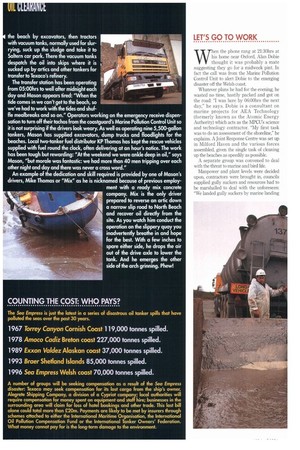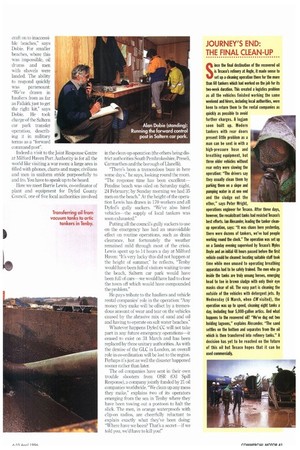WWh en the phone rang at 21:30hrs at is home near
Page 42

Page 43

If you've noticed an error in this article please click here to report it so we can fix it.
Oxford, Alan Dobie t it was probably a mate suggesting they go for a midweek pint. In fact the call was from the Marine Pollution Control Unit to alert Dobie to the emerging disaster off the Welsh coast.
Whatever plans he had for the evening, he wasted no time, hastily packed and got on the road: "I was here by 06:00hrs the next day," he says. Dobie is a consultant on marine projects for AEA Technology (formerly known as the Atomic Energy Authority) which acts as the IVIPCU's science and technology contractor. "My first task was to do an assessment of the shoreline," he explains. A Joint Response Centre was set up in Milford Haven and the various forces assembled, given the single task of cleaning up the beaches as speedily as possible.
A separate group was convened to deal with the threat to marine and bird life.
Manpower and plant levels were decided upon, contractors were brought in, councils supplied gully suckers and resources had to be marshalled to deal with the unforeseen: "We landed gully suckers by marine landing
craft on to inaccessible beaches," says Dobie. For smaller beaches, where this was impossible, oil drums and men with shovels were landed. The ability to respond quickly was paramount: "We've drawn in hauliers from as far as Falkirk just to get the right kit," says Dobie. He took charge of the Sahern car park transfer operation, describing it in military terms as a "forward command post".
Indeed a visit to the Joint Response Centre at Milford Haven Port Authority is for all the world like visiting a war room: a large area is filled with phones, charts and maps; civilians and men in uniform stride purposefully to and Ira You have to speak up to be heard.
I Iere we meet Barrie Lewis, co-ordinator of plant and equipment for Dyfed County Council, one of five local authorities involved in the clean-up operation (the others being district authorities South Pembrokeshire, Preseli, Carmarthen and the borough of Llanelli),
"There's been a tremendous buzz in here sonic days," he says, looking round the room. "The response time has been excellentPendine beach was oiled on Saturday night, 24 February; by Sunday morning we had 35 men on the beach." At the height of the operation Lewis has drawn in 170 workers and all Dyfed's gully suckers. "We've also hired vehicles—the supply of local tankers was soon exhausted."
Putting all the council's gully suckers to use on the emergency has had an unavoidable effect on routine operations, such as drain clearance, but fortunately the weather remained mild through most of the crisis. Lewis spent up to 14 hours a day at Milford Haven: "It's very lucky this did not happen at the height of summer," he reflects, "Tenby would have been full of visitors waiting to use the beach, SaItern car park would have been full of cars—we would have had to close the town off which would have compounded the problem."
He pays tribute to the hauliers and vehicle rental companies' role in the operation: "Any money they make will be offset by a tremendous amount of wear and tear on the vehicles caused by the abrasive mix of sand and oil Isis.1 having to operate on salt water beaches."
Whatever happens Dyfed CC will not take part in any future emergency operations—it ceased to exist on 31 March and has been replaced by three unitary authorities. As with the demise of the GLC in London, an overall role in co-ordination will be lost to the region. Perhaps it's just as well the disaster happened sooner rather than later.
The oil companies have sent in their own trouble shooters from OSR (Oil Spill Response), a company jointly funded by 21 oil companies worldwide. "We clean up any mess they make," explains two of its operators emerging from the sea in Tenby where they have been towing out a pontoon to halt the slick. The men, in orange waterproofs with clip-on radios, are cheerfully reluctant to explain exactly what they've been doing: "Where have we been? That's a secret—if we told you, we'd have to kill you!"
















































































































